#andropause for men
Text
Andropause : lutter contre le déclin de la testostérone ( + programme entraînement )
NOUVEAU PROGRAMME 👉 Andropause : lutter contre le déclin de la testostérone ( + programme entraînement )
Si vous avez plus de 30 ans, ne perdez plus de temps, l’andropause ou le déficit androgénique lié à l’âge est un vrai problème. Vous voulez savoir comment mieux vivre votre andropause, vous entrainer et ne pas sombrer dans l’isolement et la déprime ? J’ai fait des recherches pour vous apporter les connaissances actuelles afin que vous puisiez retrouver ou conserver la pleine forme malgré l’âge…
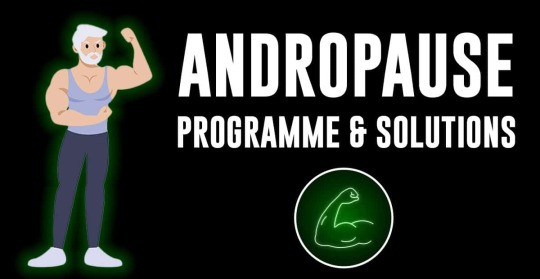
View On WordPress
#andropause#andropause age#andropause chez l&039;homme symptomes#andropause definition#andropause for men#andropause homme#andropause in hindi#andropause in telugu#andropause männer#andropause meaning#andropause précoce#andropause symptomes#andropause symptoms#andropause traitement#andropause treatment#conseils andropause#homme#ménopause homme#santé des hommes#symptômes andropause#traitement andropause
0 notes
Text
Do Men Really Go Through Menopause?
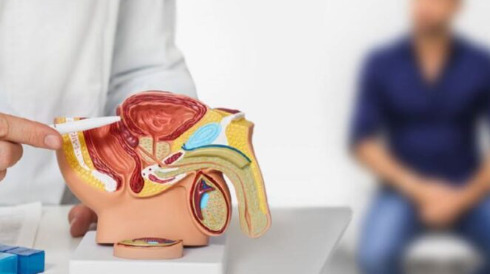
Andropause, often known as male menopause, is the slow reduction in testosterone levels that affects older men. This hormone imbalance can cause a variety of physical and mental symptoms, such as exhaustion, reduced libido, mood swings, and poor cognitive function. While andropause symptoms may be less evident than those experienced by women during menopause, they can nonetheless have a substantial influence on a man's quality of life. The fall in testosterone production is a natural component of the aging process, caused by the testes losing their ability to generate hormones in normal amounts. Symptoms of a testosterone drop include weariness, low energy levels, muscle mass loss, increased body fat, and decreased bone density. Hormonal changes during andropause can also have an impact on a man's mental health, including mood swings, aggression, and depression. It is crucial to note that not all guys will experience these symptoms in the same way or at all. Male menopause symptoms include weariness, diminished libido, mood swings, cognitive impairments, and changes in body composition. However, you should see a doctor to rule out any other underlying health concerns that could be producing these symptoms. Despite mounting evidence of andropause, there remain myths and misconceptions about male menopause. It is critical to debunk these beliefs and create knowledge about male menopause in order to give men with support and understanding during this period of life. Men suffering male menopause can cope by getting medical guidance, living a healthy lifestyle, reducing stress, and seeking support from loved ones.
0 notes
Text
Is Andropause Real? Can Men Get Menopause?

In this condition, there is a gradual decrease in testosterone levels in men, affecting them physically and emotionally. While it’s a common problem in men as they age, its significance can immensely affect the health and well-being of men.
Unveil the truth: Is andropause real? Explore the facts on men experiencing menopause symptoms. Discover insights into male hormonal changes.
#Andropause#Andropause Symptoms#Andropause Causes#Male Menopause#Menopause in men#Andropause Testing#is Andropause real#Andropause Diagnostic
0 notes
Text
Andropause: The Male Menopause Mystery Every Woman Must Know
Episode 28
Healthify with kamal podcast
Andropause: The Male Menopause Mystery Every Woman Must Know
Listen Now
Episode 28
Healthify with kamal podcast
Andropause: The Male Menopause Mystery Every Woman Must Know
Have you ever stumbled upon the term ‘andropause’? Often brushed under the rug as the ‘male menopause’, this phenomenon is so much more than a man’s counterpart to women’s…
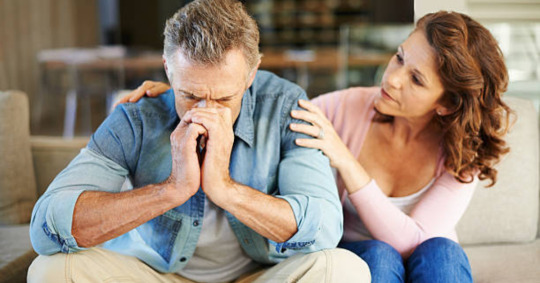
View On WordPress
0 notes
Text
What Are Andropause And The Symptoms Of Andropause For Men?
Andropause is a condition that affects men of all ages and can cause a wide range of symptoms. The signs and symptoms of Andropause are similar to those experienced by people with other health conditions such as diabetes, heart disease, or depression—but any one thing does not cause them.
Andropause is a condition that results from the decline of men’s hormone levels as they age, a natural process known as male menopause. There are many symptoms of Andropause, including:
Fatigue
Hot flashes
Increased sweating
Andropause can be treated with hormone replacement therapy (HRT). HRT is available in many forms and from various sources—you may be able to find it at your local pharmacy or health clinic.
0 notes
Text
Healthy Aging for Men with Chinese Medicine
Healthy Aging for Men with Chinese Medicine
June is Men’s Health month, a time to highlight the need for more awareness of men’s health issues. Given that statistically men usually have shorter life expectancies and poorer overall health when compared to women, this is not just a courtesy tip. The reasons for these poorer health outcomes may be a combination of genetic and social influences. Genetically, men are more prone to heart disease…

View On WordPress
0 notes
Note
Don't both cis men and cis women get hormone replacement therapy too and even cis kids too?
Like I'm 90% sure cis people and even cis kids also get HRT when they lack specific or have too much of a specific hormone in their body
Like I even read that this is a real treatment for those who are intersex or have PCOS or just for cosmetic reasons for cis men and women
Yup, HRT was originally made to help women with menopause and men with andropause. Same way hormone blockers were at first made to help treatment for cancer, since if you stop sex hormone production you halt a lot of general cell production and therefore cancer cell production, and then adapted further hormone disordered people and those suffering with early puberty.
Like most of the argument is literally "SURE THIS EXISTS FOR ALMOST CENTURIES...BUT THE LONG TERM EFFECTS!!!" Which is a very dishonest arguemnt when we know damn well they just straight up want ban HRT for transitioning because they don't want people to transition not because of any actual fear the medication is flawed, which they still have no proof of.
39 notes
·
View notes
Text
Okay but what if...
listen, this might sound crazy, but... I have a theory.
Most people know about ciswomen having menopause, but did you guys know that men go through menopause too? But as cismen. It's called andropause.
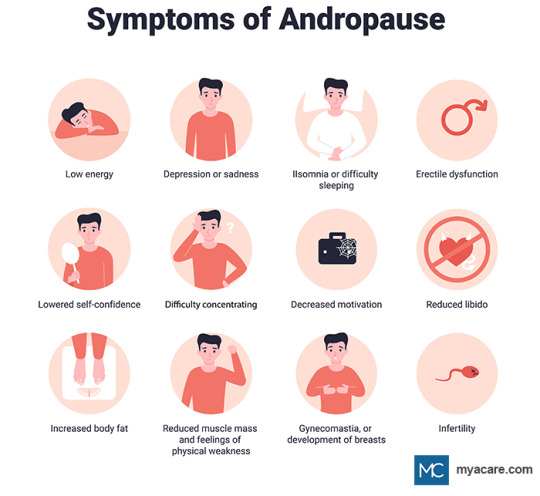
It seems to me it might be kinda similar to a midlife crisis, but biologically. To me, Kazui seems to show several of these symptoms.
Let's go over some of them:
Depression (some of these also tie into lowered self-confidence):



Decreased motivation:


Feeling of physical weakness:

(there's other mentions of him calling himself an old man)
Furthermore, his age also fits well.

It's kinda suspicious he's 39 - one year off from 40

9 notes
·
View notes
Text
I Will Not Lose Her
(Written August 25, 2016, edited in 2024)
When a cataclysmic storm rages between friends, we often look at the relationship itself. What went wrong? That is what I did with her. I examined the relationship. I am sure she did as well. However, I think a deeper part of me had a better, though unclear, understanding.
It was not the relationship. It was me. I was changing. I had changed. I had begun to yell. I hate yelling and confrontation. I had become rude and aggressive. I made her uncomfortable, and made her feel embarrassed around her friends. I would commiserate over events for days. I had become particular and fixed. Meaningless things stuck in my craw. That was not the me I had been before.
What happened to the person who bought her a flower every payday? What happened to the person who played with her like a puppy, right in front of her family? Where was the person who left little notes of affection? Where was the young adult who sat and listened to music for hours? What happened to the person who cherished the differences between peoples? The person I always thought I was, the person I had been was gone, buried under spite and burden, and mostly confusion.
We often point our fingers at familiarity. Routine steps in, and things get dull. Certainly, this played a role, but simple commonness would not turn playfulness into argument. Moreover, I had lost the ability to communicate with others, of greatest note my daughter. Something else was at work, though I could not see the condition while being consumed by it. I had changed. I was changing. The me I enjoyed had been lost, left behind like a forgotten piece of luggage.
I did not know it at the time, but andropause was eating away at the younger me. The symptoms, as I read them, did not apply, but every physiology is different. Moreover, severe Social Anxiety was also setting in, almost to the point of phobia. I have always been introverted, socially anxious, and awkward, but I was sinking into a much deeper abyss. Did changing hormones fuel the anxiety, or did the anxiety alter the andropause symptoms? Who knows? I can only see it now because it is all done and past.
I did not leave her. Oh, I started the separation, but it was not her I was fleeing. I was not abandoning the relationship. I dragged myself away from her like a dying animal sulking away from the group for the group’s protection. I pulled the yelling, particular, touchy lunatic I had become to a safe distance. During a mid-life crisis, most men think of fast cars and young women. However, I sought solitude. I hated hurting her. I detest myself for doing so. I needed to reclaim the original me and kill the monster I had become. I needed to punish myself and protect the world from my beast.
The love and affection has not faded. It has always been there, though it had to be concealed. I needed to find music again. I needed to learn to communicate again. I needed to understand parts of me I had never known, and rekindle parts that had been long gone. I have learned I am emotionally broken and immature in so many ways. I cannot reconcile love and sex. Introversion and Social Anxiety have always been parts of me. I am a dweeb, a dork, unable to be adult about the emotional and social qualities of life. I can write a book, talk sciences, teach a class, and solve problems with the best of them, but I cannot properly handle human interactions. The human equations, the personal qualities, are knots I cannot untie. Autism, Asperger’s, perhaps there is a sprinkle of these in my matrix. Looking in someone’s eyes is more frightening than revealing.
I miss her. I always will. I dream about her more than any other person or thing. I wake up crying several times a year, and I do not see that changing. My hormones have settled. I have crossed the mid-life crisis, and understand myself. I listen to music again, and play. I let things go. The tensions are gone. Life’s difficult challenges are faced straightforward. The love is there and always will be. I will die with her name on my lips.
I have lost her presence, though I will not lose her.
2 notes
·
View notes
Text

Do you think menopause and breast cancer only affect women? Think again! Men can experience andropause too with symptoms like mood swings and low energy. Its rare but true! Learn more about such surprising facts about men's health here! #MensHealth👦🏻⚕️
0 notes
Text
Managing Male Menopause: Tips For Coping With Symptoms And Seeking Treatment
Are you a man experiencing unexplained mood swings, fatigue, or changes in libido? You might be facing male menopause, a condition often overlooked but just as significant as its female counterpart. In this blog post, we delve into understanding the symptoms of male menopause and provide valuable tips on how to cope with the physical and emotional changes it brings. Let's uncover the ways to manage male menopause effectively and break the stigma surrounding it! How To Treat Male Menopause
Understanding the Symptoms of Male Menopause
Male menopause, also known as andropause, is a natural hormonal shift that typically occurs in men as they age. One of the primary hormones affected during this time is testosterone, leading to various physical and emotional symptoms. Symptoms may include fatigue, reduced muscle mass, weight gain around the abdomen, and decreased libido. On an emotional level, men may experience mood swings, irritability, depression, or anxiety.
Recognizing these symptoms early on is essential to seeking appropriate treatment and support. While male menopause can be challenging to navigate due to its subtlety compared to female menopause, understanding the signs can help manage its impact on daily life effectively. By proactively acknowledging and addressing these symptoms, individuals can improve their quality of life during this transitional phase.
Coping with Physical and Emotional Changes
Coping with physical and emotional changes during male menopause can be a challenging experience for many. Recognizing and acknowledging the symptoms, including fatigue, irritability, weight gain, and decreased libido, is essential.
Regular exercise can help alleviate some physical symptoms by boosting energy levels and improving overall well-being. Maintaining a healthy diet rich in fruits, vegetables, lean proteins, and whole grains can also support hormone balance.
Emotionally, it's important to prioritize self-care practices such as mindfulness meditation or therapy to navigate feelings of anxiety or depression. Seeking support from loved ones or joining a men's support group can also provide valuable outlets for sharing experiences and coping strategies. Remember that it's okay to seek professional help if needed.
Communication and Support in Dealing With Male Menopause
Communication and support play a crucial role in dealing with male menopause. It's essential for individuals experiencing symptoms to open up to their partners, friends, or healthcare providers about what they're going through. Expressing feelings and concerns can help alleviate the emotional burden often accompanying this stage of life.
Having open and honest conversations can also lead to better understanding and empathy from those around you. Support from loved ones can make a significant difference in coping with the physical and emotional changes that come with male menopause. It creates a sense of validation and reassurance that you're not alone in facing these challenges.
Seeking professional help is another important aspect of managing male menopause symptoms effectively. Therapists or support groups specialized in dealing with men's health issues can provide valuable guidance and strategies for navigating this transitional phase. Remember, it's okay to ask for help when needed!
Breaking the Stigma Surrounding Male Menopause
Male menopause, also known as andropause, is a natural phase in a man's life characterized by hormonal changes that can lead to various physical and emotional symptoms. Unfortunately, there is still stigma and misunderstanding surrounding this condition, often leading to men feeling embarrassed or ashamed to seek help.
It's essential to recognize that male menopause is a natural phenomenon that affects many men as they age. By shedding light on this topic and increasing awareness, we can help normalize discussions around male menopause and encourage open conversations about its symptoms and treatment options.
Dispelling myths and misconceptions about male menopause is crucial in breaking down barriers to seeking support. Education plays a vital role in empowering both men experiencing these symptoms and their loved ones to positively address the challenges associated with this stage of life.
By fostering an environment of understanding and acceptance, we can create a supportive community where individuals feel comfortable discussing their experiences with male menopause without fear of judgment or ridicule. Let's work together to break the stigma surrounding male menopause and promote empathy, compassion, and informed decision-making for those navigating this transitional period.
Lifestyle Changes to Help Manage Symptoms
Making positive lifestyle changes can significantly impact the symptoms of male menopause. Regular exercise, a balanced diet rich in fruits and vegetables, and adequate sleep are essential for overall well-being. Maintaining a healthy weight and reducing stress through relaxation techniques like yoga or meditation can help alleviate symptoms.
Moreover, limiting alcohol consumption and quitting smoking can have a positive effect on hormonal balance. Engaging in activities you enjoy, spending time with loved ones, and seeking professional help when needed are all crucial steps towards managing male menopause effectively.
By taking control of your health through these lifestyle adjustments, you can improve your quality of life and navigate the challenges associated with male menopause more successfully. Remember that seeking support from healthcare providers, therapists, or support groups is always an option if you find yourself struggling to cope with the physical and emotional changes that come with this stage of life. Embracing these lifestyle changes empowers you to take charge of your well-being and live a fulfilling life despite the challenges posed by male menopause.

0 notes
Text
Hormone Therapy for Men - Reclaiming Vitality and Well-Being
At The Enhancement of Life Center, we understand the significant impact that hormonal imbalances can have on men's health and quality of life. As men age, they may experience a decline in testosterone levels, leading to a condition known as andropause. This can result in a range of symptoms, including decreased energy, reduced libido, muscle loss, and mood changes.

Our team of experienced healthcare professionals specializes in providing personalized hormone therapy for men, utilizing natural bio-identical hormones to restore hormonal balance and alleviate symptoms. We recognize that every man's hormonal needs are unique, which is why we develop individualized treatment plans tailored to each patient's specific requirements.
One of the most effective methods we use for hormone therapy in men is hormone pellet therapy. This innovative treatment involves inserting small pellets under the skin, typically in the hip area, through a minor incision. These pellets gradually release small doses of bio-identical hormones over an extended period, providing consistent and optimal therapy.
The benefits of hormone therapy for men are numerous. By restoring testosterone levels to a healthy range, men can experience increased energy, improved mood, enhanced libido, and better overall well-being. Additionally, hormone therapy can help preserve muscle mass, maintain bone density, and support cognitive function.
At The Enhancement of Life Center, we prioritize patient safety and comfort. Our team of skilled professionals ensures that the pellet insertion process is quick, minimally invasive, and virtually painless. We use advanced techniques and state-of-the-art equipment to deliver the highest quality care to our patients.
If you're a man experiencing symptoms of hormonal imbalance or andropause, we encourage you to explore the benefits of hormone therapy. Our team at The Enhancement of Life Center is dedicated to helping you reclaim your vitality and enhance your quality of life through personalized hormone therapy programs.
Don't let hormonal imbalances hold you back any longer. Contact The Enhancement of Life Center today at: https://antiagingsa.com to schedule a consultation and take the first step towards optimizing your health and well-being.
0 notes
Text
A Rejuvenating Experience: My Review of Emperor's Vigor Tonic

Men's health is a complex and often overlooked aspect of well-being. As someone who prioritizes a holistic approach to health, I'm always on the lookout for natural solutions that can enhance vitality and performance. Recently, I had the opportunity to try Emperor's Vigor Tonic, a supplement specifically designed to address various aspects of male health.
I used the following product: Emperor's Vigor Tonic
A Potent Blend of Natural Ingredients
Emperor's Vigor Tonic stands out for its unique blend of natural ingredients, each carefully chosen for its potential health benefits. The formula includes:
Dodder Seed: This herb has a long history of use in traditional medicine, known for its kidney-supporting and fertility-boosting properties.
Wild Yam: This root is rich in phytoestrogens, which can help regulate hormone balance and potentially alleviate symptoms associated with andropause.
Cistanche: This adaptogenic herb is prized for its ability to improve energy levels, combat fatigue, and support overall well-being.
Poria Cocos: This mushroom has been used for centuries in Traditional Chinese Medicine, known for its immune-boosting and stress-reducing properties.
Schisandra: This adaptogenic berry is rich in antioxidants and is believed to improve cognitive function and physical stamina.
This combination of ingredients creates a well-rounded formula that addresses various aspects of male health, from physical performance to overall vitality.
Enhanced Energy and Stamina
One of the most noticeable benefits I experienced after using Emperor's Vigor Tonic was a significant increase in energy levels. I felt more alert and focused throughout the day, with a noticeable improvement in my physical stamina. This was particularly helpful during exercise, allowing me to push myself further and experience a more productive workout.
Improved Performance and Confidence
Beyond the physical benefits, I also noticed a positive impact on my overall performance and confidence. The increased energy levels translated into a renewed sense of vitality, which positively affected my personal and professional life.
A Safe and Natural Approach
It's important to note that Emperor's Vigor Tonic is formulated with natural ingredients and is generally considered safe for daily use. However, it's always recommended to consult with a healthcare professional before starting any new supplement, especially if you have any underlying medical conditions.
Overall Satisfaction
My experience with Emperor's Vigor Tonic has been overwhelmingly positive. The natural formula, combined with the noticeable improvements in energy, stamina, and overall well-being, makes it a valuable addition to my wellness routine. If you're seeking a natural solution to enhance your male vitality, I highly recommend giving Emperor's Vigor Tonic a try.
Source: Buy this product link
1 note
·
View note
Link
Andropause, often called male menopause, presents a significant shift in a man's hormonal balance, primarily marked by reduced testosterone levels. While this natural phase can introduce various physical and emotional challenges, understanding and adopting effective preventative strategies can significantly ease the transition. This comprehensive article offers 50 actionable tips to help men maintain optimal health, manage symptoms, and potentially delay the onset of andropause. From dietary adjustments to lifestyle changes and mental health supports, each strategy is designed to empower men to lead a balanced and healthier life during midlife and beyond. 1. Maintain a Balanced Diet: A balanced diet is crucial in preventing andropause because it directly influences hormone production. Zinc, found in foods like oysters, beef, and spinach, plays a vital role in testosterone regulation. Healthy fats from avocados and nuts support hormone balance and cellular function, ensuring the body has the necessary nutrients to maintain optimal hormone levels. 2. Regular Exercise: Exercise boosts testosterone production, which is key in preventing andropause. Strength training, such as lifting weights or using resistance bands, specifically enhances hormone production. Cardiovascular exercises help maintain heart health and manage weight, both important for hormonal balance as excess body fat can convert testosterone to estrogen. 3. Manage Stress Effectively: Chronic stress reduces testosterone levels, exacerbating andropause symptoms. Practices like mindfulness, meditation, and yoga can lower stress hormones like cortisol, thereby preserving testosterone levels. Effective stress management supports overall hormonal health and enhances life quality. 4. Ensure Quality Sleep: Testosterone production peaks during sleep, making quality sleep crucial for preventing andropause. Ensuring 7-9 hours of uninterrupted sleep allows the body to properly produce and regulate testosterone, thus maintaining hormonal balance and reducing the risk of andropause. 5. Consider Supplements Wisely: Supplements like Vitamin D, magnesium, and fenugreek have roles in supporting testosterone production and overall hormone health. By consulting with healthcare providers before starting supplements, men can safely address potential deficiencies and maintain optimal hormonal levels, which is key in preventing andropause. 6. Regular Health Check-Ups: Regular medical check-ups facilitate early detection and management of andropause symptoms. Monitoring testosterone levels through blood tests allow for early intervention and personalized health strategies, critical for delaying or mitigating the effects of andropause. 7. Limit Alcohol and Quit Smoking: Alcohol and smoking both lower testosterone levels and worsen andropause symptoms. By reducing intake or quitting, men can improve their hormonal balance and reduce the severity of andropause, thus maintaining better overall health. 8. Monitor Weight: A healthy weight supports hormonal balance, critical in preventing andropause. Excess fat, particularly around the waist, can increase estrogen levels while decreasing testosterone. Regular physical activity and a balanced diet are essential for weight management and hormonal regulation. 9. Stay Socially Active: Social activity can mitigate stress and depression, common during andropause. Maintaining social connections supports emotional well-being and indirectly helps sustain healthier testosterone levels, which are vital for preventing andropause. 10. Consider Herbal Remedies: Herbal supplements like ashwagandha, ginseng, and saw palmetto may support hormonal health. When used under medical supervision, these herbs can help maintain testosterone levels, contributing to the prevention of andropause and its associated symptoms. 11. Practice Mindfulness and Meditation: Mindfulness and meditation help reduce stress by lowering cortisol levels, which can otherwise negatively affect testosterone production. These practices also aid in managing psychological symptoms commonly seen in andropause, such as irritability and mood swings, enhancing emotional resilience and overall mental health. 12. Engage in Mental Exercises: Mental exercises stimulate cognitive function, which can decline with lower testosterone levels during andropause. Activities like puzzles, reading, and learning new skills keep the brain engaged and active, potentially slowing cognitive decline and maintaining mental acuity as hormone levels change. 13. Stay Hydrated: Adequate hydration supports overall bodily functions and hormone balance. Drinking sufficient water aids in weight management and metabolic efficiency, which are crucial for maintaining optimal testosterone levels and preventing the symptoms of andropause. 14. Increase Intake of Omega-3 Fatty Acids: Omega-3 fatty acids are vital for reducing systemic inflammation and supporting neuronal health both of which can be adversely affected by hormonal changes during andropause. Regular consumption of omega-3s, through diet or supplements, helps maintain hormonal balance and overall brain health. 15. Reduce Exposure to Endocrine Disruptors: Endocrine disruptors like BPA and phthalates can mimic or interfere with body hormones, including testosterone. By reducing exposure to these chemicals, you can help maintain natural hormone levels, thus aiding in the prevention of andropause symptoms. 16. Adaptogenic Herbs: Adaptogenic herbs like Rhodiola and Holy Basil improve the body's resilience to stress, a key factor in maintaining hormonal balance. These herbs support the adrenal system and help stabilize cortisol levels, which is crucial for preventing testosterone depletion during andropause. 17. Regular Sunlight Exposure: Sunlight exposure increases vitamin D production, crucial for testosterone synthesis and overall hormone regulation. Consistent sunlight exposure ensures adequate vitamin D levels, which support hormonal health and help prevent the onset of andropause symptoms. 18. Prioritize Healthy Fats: Healthy fats are essential components for hormone production, including testosterone. Consuming fats from sources like olive oil, coconut oil, and avocados helps ensure the body has the necessary building blocks to maintain hormonal balance and mitigate the effects of andropause. 19. Thermal Therapy: Thermal therapies such as saunas or steam baths promote detoxification and enhance circulation. Improved circulation can boost overall health, including the efficiency of hormone production and regulation, potentially alleviating andropause symptoms. 20. Amino Acid Supplementation: Amino acids, like D-aspartic acid, play a role in the synthesis and regulation of testosterone. Supplementing with these amino acids can support natural hormone production, offering a preventive measure against the declines seen in andropause, subject to medical guidance to ensure safety and efficacy. 21. Focus on Polyphenol-Rich Foods: Polyphenol-rich foods like berries, green tea, and dark chocolate can combat inflammation and oxidative stress, which negatively affect testosterone levels. By reducing these physiological stressors, these foods help maintain healthier hormone levels, crucial for preventing the onset of andropause. 22. Progressive Muscle Relaxation Techniques: Progressive muscle relaxation aids in reducing stress and anxiety, which can significantly impact hormonal health by lowering cortisol levels that interfere with testosterone production. This technique promotes overall relaxation, beneficial for maintaining stable hormone levels during andropause. 23. Regular Sexual Activity: Engaging in regular sexual activity has been shown to boost testosterone levels naturally, which can decline during andropause. This helps not only in maintaining hormonal balance but also improves mood, self-esteem, and overall well-being, all of which are crucial during the andropause period. 24. Intermittent Fasting: Intermittent fasting can enhance hormone balance and improve metabolic health, both of which influence testosterone levels. This eating pattern helps regulate the hormones involved in metabolism and can lead to a more favorable hormone profile to counteract andropause. 25. Cold Showers or Hydrotherapy: The use of cold showers or hydrotherapy, such as alternating between hot and cold temperatures, can stimulate the body’s vascular system and enhance circulation. Improved circulation is linked to better overall hormone production and management, helping to mitigate the symptoms of andropause. 26. Increase Magnesium Intake: Magnesium plays a pivotal role in numerous enzymatic reactions, including those necessary for testosterone production. By ensuring adequate magnesium intake, men can support their hormonal health and potentially prevent fluctuations typical of andropause. 27. Enhance Dietary Fiber Intake: Fiber aids in digestive health and weight management, both of which are vital as men age and experience hormonal changes. A well-managed digestive system and healthy weight contribute to more stable hormone levels, reducing the risk of andropause. 28. Limit Caffeine and Sugar: Reducing caffeine and sugar intake can help stabilize energy and mood fluctuations that are exacerbated by hormonal imbalances during andropause. Stable blood sugar and energy levels support overall hormonal health and mitigate stress on the body. 29. Practice Deep Breathing Exercises: Deep breathing exercises enhance oxygenation and promote relaxation, directly impacting stress levels. Since stress can negatively affect hormone production, managing stress through deep breathing can support more stable testosterone levels during andropause. 30. Optimize Thyroid Function: Proper thyroid function is crucial as it interacts closely with other hormones, including testosterone. Ensuring thyroid health through adequate intake of selenium and iodine can help maintain overall hormone balance, crucial for preventing symptoms associated with andropause. 31. Incorporate Choline-rich Foods: Choline is crucial for liver function, brain development, and muscle movement—areas that can be impacted during andropause. Consuming choline-rich foods like eggs, lean meats, and fish helps support these vital functions, enhancing overall health and mitigating some of the physical and cognitive declines associated with andropause. 32. Try Acupuncture: Acupuncture can alleviate symptoms commonly associated with andropause, such as anxiety, depression, and insomnia, by balancing the body's energy flow. This practice can improve overall well-being and hormonal balance, contributing to a more stable hormonal environment as men age. 33. Attend Support Groups: Support groups provide a space for sharing experiences and coping strategies, which can be invaluable for managing the emotional and psychological challenges of andropause. This communal support can help alleviate stress, improve mental health, and provide insights into effective lifestyle adjustments. 34. Explore Music and Art Therapy: Music and art therapy offer therapeutic benefits that can reduce stress and enhance emotional expression. Engaging in these activities provides a constructive outlet for dealing with emotions and can improve mental health, thereby indirectly supporting hormonal balance during andropause. 35. Engage in Regular Outdoor Activities: Regular outdoor activities not only boost vitamin D levels through sunlight exposure but also enhance mood and general mental health through physical activity and engagement with nature. These benefits are essential for maintaining well-being and reducing stress, factors important in managing andropause. 36. Monitor Blood Sugar Levels: Keeping blood sugar levels stable can prevent the hormonal imbalances that often accompany andropause. By choosing low-glycemic foods and managing carbohydrate intake, men can avoid insulin spikes that may exacerbate hormonal fluctuations and symptoms of andropause. 37. Consider Phytoestrogens: Phytoestrogens in foods like flaxseeds, soybeans, and tofu can mimic estrogen in the body, potentially helping to balance hormone levels during andropause. These natural compounds offer a way to moderate the hormonal changes that occur during this period. 38. Stay Mentally Active: Maintaining mental activity through puzzles, games, reading, and learning new skills helps counteract cognitive decline associated with decreasing testosterone levels during andropause. Continuous cognitive stimulation is vital for sustaining brain health and overall cognitive functions. 39. Implement Structured Problem-Solving: Structured problem-solving can effectively manage the stress that exacerbates andropause symptoms. By systematically addressing stressors, men can reduce their psychological impact, maintaining better mental and hormonal health. 40. Explore Reflexology: Reflexology helps improve overall health by stimulating specific points related to body systems, including those that regulate stress and anxiety. This form of therapy can lead to reduced stress levels, which is crucial for maintaining hormonal balance and alleviating symptoms of andropause. 41. Utilize Essential Oils: Aromatherapy with essential oils such as lavender, sandalwood, and peppermint promotes relaxation, enhances sleep quality, and reduces depression and anxiety—all factors that can exacerbate andropause symptoms. Improved relaxation and sleep contribute to better hormonal balance and overall health. 42. Practice Tai Chi or Qigong: Tai Chi and Qigong combine physical movement, meditation, and controlled breathing, which not only improve physical balance and flexibility but also aid in stress reduction and hormonal balance. These practices help stabilize mood and maintain energy levels, crucial for managing andropause. 43. Hydrate With Electrolyte-Rich Drinks: Staying hydrated with electrolyte-rich drinks supports cellular function and overall physical performance, which can be compromised during andropause. Proper hydration is essential for maintaining bodily functions and hormone levels. 44. Opt for Low-Impact Aerobic Exercises: Low-impact aerobic exercises such as swimming, cycling, or walking maintains cardiovascular health and helps in weight management, important for hormone regulation and mitigating the effects of andropause without overstraining the joints. 45. Explore Biofeedback: Biofeedback helps individuals gain better control over physiological processes that are often affected by stress, such as heart rate and muscle tension. Managing these can reduce the impact of stress and anxiety, which often worsen during andropause. 46. Adjust to Smaller, More Frequent Meals: Eating smaller, more frequent meals can stabilize metabolism and energy levels throughout the day, supporting hormonal balance and helping to manage body weight—key factors in mitigating andropause symptoms. 47. Use Light Therapy: Light therapy can effectively treat mood swings and depressive symptoms associated with andropause by regulating circadian rhythms, especially during months with limited natural sunlight. This helps maintain a normal sleep-wake cycle, which is crucial for hormonal balance. 48. Increase Intake of Antioxidants: Antioxidants help combat oxidative stress, which increases with age and can accelerate hormonal decline. By consuming foods rich in antioxidants, men can protect their cells from damage and support healthier aging, thus potentially delaying the onset of andropause. 49. Seek Professional Counseling: Professional counseling provides a space to address the emotional and psychological challenges of andropause. Counseling can help men develop coping strategies for anxiety, depression, and self-esteem issues, which are critical for maintaining mental and emotional health during andropause. 50. Cultivate a Supportive Environment: Creating a supportive environment with friends, family, and peers who understand and support one's experience through andropause can significantly improve emotional well-being. This supportive network can provide emotional stability and stress relief, which are vital for managing hormonal changes during andropause. Conclusion: Navigating andropause doesn't have to be a daunting journey. By incorporating these 50 proactive and holistic strategies, men can significantly enhance their quality of life and mitigate the effects of hormonal changes associated with aging. Regular healthcare consultations, consistent lifestyle adjustments, and a supportive social network are foundational elements that enable men to manage andropause effectively. Embrace these practices to maintain vitality, boost hormonal health, and foster well-being throughout the andropause transition and beyond.
0 notes
Text
Hormonal Changes Throughout the Lifespan
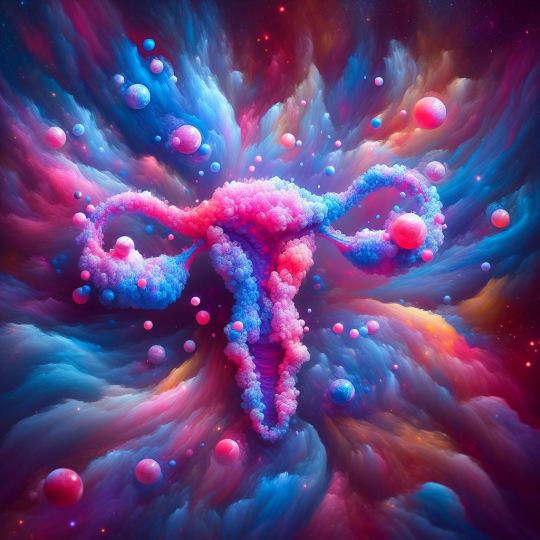
Hormones play a crucial role in our bodies, regulating various bodily functions and processes. Throughout our lifespan, our hormone levels fluctuate and change, impacting our physical and emotional health in different ways. In this blog post, let’s explore the hormonal changes that occur at different stages of our lives.
Infancy and childhood: During infancy and childhood, hormone levels are relatively stable. Growth hormone plays a key role in physical growth and development during this stage. Additionally, hormone levels like melatonin, which regulates sleep-wake cycles, are also important in establishing healthy sleep patterns.
Adolescence: Adolescence is a period of significant hormonal changes, particularly due to the onset of puberty. During this time, the body starts to produce higher levels of sex hormones such as oestrogen and testosterone. These hormones are responsible for the development of secondary sexual characteristics like breast development in females and facial hair growth in males. Hormonal fluctuations during adolescence can also lead to mood swings, acne, and changes in body shape.
Adulthood: In adulthood, hormone levels continue to fluctuate, particularly in women. Menstrual cycles in women are regulated by oestrogen and progesterone, with levels fluctuating throughout the month. In men, testosterone levels gradually decline with age, leading to symptoms like decreased muscle mass, lower libido, and fatigue. For both men and women, hormonal imbalances can occur due to factors like stress, diet, or medical conditions.
Pregnancy and childbirth: Pregnancy is a time of profound hormonal changes in women. Hormones like oestrogen and progesterone increase significantly to support the growth and development of the fetus. After childbirth, hormone levels shift dramatically, leading to changes in mood, energy levels, and breastfeeding capabilities.
Menopause and andropause: Menopause marks the end of a woman's menstrual cycles and is characterised by a decline in oestrogen and progesterone levels. This transition can lead to symptoms like hot flashes, mood swings, and osteoporosis. In men, andropause refers to the gradual decline in testosterone levels with age, leading to symptoms like decreased muscle mass, fatigue, and sexual dysfunction.
It's important to recognise that hormonal changes are a natural part of the ageing process and can impact our overall health and well-being. If you are experiencing symptoms of hormonal imbalances, it's essential to consult with a healthcare provider for proper diagnosis and treatment options. By understanding the hormonal changes that occur throughout our lifespan, we can better navigate these transitions and maintain optimal health and vitality.
Read the full article
0 notes
Text
The Benefits of Testosterone Replacement Therapy for Men!

As a man, you will feel physical and mental changes in your body. In simple words, this process is called andropause or male menopause. The reason behind this change is; that testosterone levels go down and it causes many health-related problems.
0 notes